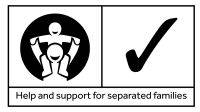As fellow parents, you are both key to your kids lives and role models to them, so if they see dad and mum tearing each other apart, your children are set to suffer the most
I Hate Her!
Why – and how – you need to resolve things with your ex
You hate her… She makes your life a misery… You fought when you were together – and it’s even worse now you’ve separated… But that’s not a healthy way to live, and very damaging and stressful for your children – whom you both love – and who have the right to love you both.
As fellow parents, you are both key elements in your kids’ lives and role models to them, so if they see dad and mum tearing each other apart, your children are set to suffer the most. Your relationship may have ended, but your role as parents hasn’t, so you need to join forces and work together for the sake of your children.
Making an effort to discuss problems rationally and calmly, talking issues through instead of shouting and swearing at each other and treating each other civilly and with respect will stop this downward spiral of hatred and bitterness, which is having such a destructive effect on your self esteem and your relationship with your kids.
Yes it may take some serious lip biting, head scratching, soul searching and pride swallowing, but finding a way forward to get on with your ex as a fellow parent can only improve your own life, her life and most importantly your children’s lives. Try making that first step today.
You’re always going to disagree about something, but the way you handle problems with your ex is key to resolving your conflict. Things need to change, but lashing out, however tempting it may be, isn’t the answer.
DO:
- Put your children first. Ask yourself whether your demands or behaviour stem from a real desire to benefit your son or daughter – or are you selfishly craving to score points over or hurt or punish your ex?
- Walk away rather than get sucked into shouting, screaming and name-calling in front of the kids. No doubt they saw enough of this when you were together and hearing their parents lash out at each other will only hurt, stress and upset them further. If you sense an argument brewing, stop, take a deep breath and say: “we do need to talk about this, but not here in front of the children”. And to prove you’re not just avoiding the issue, phone her later to talk it through or arrange a meeting.
- Admit if you’ve been wrong and recognise your contribution to any ongoing problems.
- Make every effort to discuss issues calmly and rationally. Meet in a public place, without the kids, take a list of things you want to cover, listen properly to her side and then give your own, negotiate/compromise/agree to disagree and then propose a way forward. Make sure you are both totally clear about what you’ve agreed and if necessary get one of you to type it up so you’ve got it in writing.
- Stick to what you’ve agreed, however hard it may be. If you really need to change something you agreed on, hold another meeting. Never go back on a promise as she won’t believe a word you say in the future.
DON’T:
- Rise to her bait. If she consistently describes you as a “waste of space” in front of the children, it’s tempting to respond with “well you’re a selfish cow who never thinks of anyone but yourself”. Then the insults will fly and the real issue that’s causing this problem will remain unresolved.
- Launch a spiteful revenge attack. How you deal with her abusive behaviour will be a lesson to your children in standing up to bullies in the playground, manipulative friends or intimidating bosses at work. How often do we teach our kids that hitting back is no way to solve a problem? If your children bad mouth you – or each other – you stop them, so it’s terribly confusing for them to hear one parent bad mouthing another.
- Use bullying, intimidating or aggressive tactics – however appalling her behaviour may be. That’s only guaranteed to make things worse and is not a good example to your kids.
- Start a text war. When you’re not talking directly to someone, it’s easy to fire off nasty comments and let a battle rage unabated for hours, whereas a five-minute phone call could address the whole issue quickly and easily.
- Bring up past issues relating to your relationship breakdown that don’t have much bearing on the problem in hand. Keep your conversations focused on what needs to be addressed.
- Have a go at her without knowing all the facts. Things you’ve heard from the kids may be only partly true, misconstrued or downright twisted as they explore the boundaries of playing one parent off against the other. “Can you tell me what happened at your house last night” is a much better approach than launching into a “How dare you say…”
If it weren’t for the kids, you’d never see her, speak to her or have anything to do with her. But you do have children together who are dependent on both their parents, and you need to respect her as an equal parent and keep the lines of communication open.
DO:
- Be as open as you can. You may feel it will give her more ammunition in her attacks on you, but not as much as if she finds out you’ve been withholding information. Let her know if the kids have played you up all weekend or developed strange eating or behavioural habits – she might be having similar problems with them and you may even be able to work on the issues together.
- Make sure you tell her about any school event involving your son or daughter, or if a teacher’s raised concerns with you about their behaviour or work – as joint parents you both have an equal right to information about your children’s education.
- Give her as much notice as possible about proposed holidays or changes to childcare arrangements, or simply if you’re running late for collecting or dropping off the children.
- Share relevant information with her such as additional responsibilities you’ve given them around your house, new foods they’ve enjoyed, ideas you’ve got for Christmas presents or even funny stories involving their time with you. In this way, she will feel more involved and respected.
DON’T:
- Neglect to tell her something just to spite her. She’ll eventually find out and have good reason to be mad.
- Pass messages to her via your children – that’s a recipe for miscommunication.
- Ignore potential problems or fail to address them until the very last minute. You’re more likely to receive a favourable response to a request if you ask well in advance and give options as well. For example: “It’s Mum’s 60th birthday on November 8th, which is your weekend. We’re having a party on the Saturday evening and I’d really like the kids to be there. Would you prefer to swap weekends or could I pick them up on Saturday evening, and make up the time with you on another day?”
- Be petty. If she has issued a reasonable request such as picking up or dropping off the kids on time, respecting bed times, ensuring their clothes and belongings are returned at the end of your weekend… make an effort to go along with it. It really will make life easier for you, the kids will see that you respect her wishes and it will help cut down on simmering issues.
However badly she treats you, however much you hate her, remember she is your children’s mother and they are likely to judge you on how you treat her. Try considering things from her perspective. Just like you, she may be feeling guilty about your split, struggling as a single parent, stressed at work, suffering relationship problems, money worries or concerns that her kids seem to prefer you more than her. Unfairly, as her ex, you’re an easy target to blame for any unhappiness in her life.
But instead of repaying abuse with abuse, try turning the tables and treat her in the way you’d like her to treat you – and that means being nice. You may equate “nice” with wimps and losers, but women often respond positively to kindness, consideration, respect and appreciation. For a start, you may shock her – and surprise is always the best form of attack. Secondly you’re teaching your kids that you respect their mother – and they should too. And thirdly you might start to break this cycle of hatred, anger, revenge and bitterness, which will make you feel better about yourself and free up your time and energy to focus on the things that really matter.
DO:
- Say sorry, please and thank you. These simple lessons are good for the children and are an easy way of showing respect.
- Make sure you acknowledge her at your children’s school events or extra-curricular activities – a simple hello and a smile is enough.
- Ask, rather than demand, when you want something, and take her feelings into account. For example: “How would you feel if I took the kids away for two weeks next summer? I appreciate that’s a long time for you to be apart from them, but I’ll make sure they call you regularly…” is more likely to receive a positive response than: “Next summer, I’m taking the kids away for two weeks”.
- Seek her advice and ask her opinion when it comes to the children, especially if you’ve got concerns about their behaviour, health or wellbeing. You are both their primary carers and it’s much better to work together and provide a united front if they need your discipline or support. Similarly, if you want to stretch the boundaries of later bedtimes, going out on their own or starting new activities, check that she’s on board with this.
{loadposition article-advertise}DON’T:
- Act like a doormat. You can still be assertive and nice. If she blanks you at your son’s football match, outright refuses a reasonable request for a holiday, interferes unnecessarily in your new relationships, badmouths you to the children and so on, don’t just take it on the chin. Talk to her about it: ask her why she’s doing it, explain that such behaviour badly affects the kids and try to reach a compromise.
If you simply can’t resolve matters, don’t let the situation fester or spiral out of control. Ask a mutual friend to act as a mediator between you or seek some professional help. Relate (www.relate.org.uk) and National Family Mediation (www.nfm.org.uk) are charities to help you resolve your relationship problems, while family-friendly lawyers Resolution (www.resolution.org.uk) specialise in resolving disputes without conflict.









